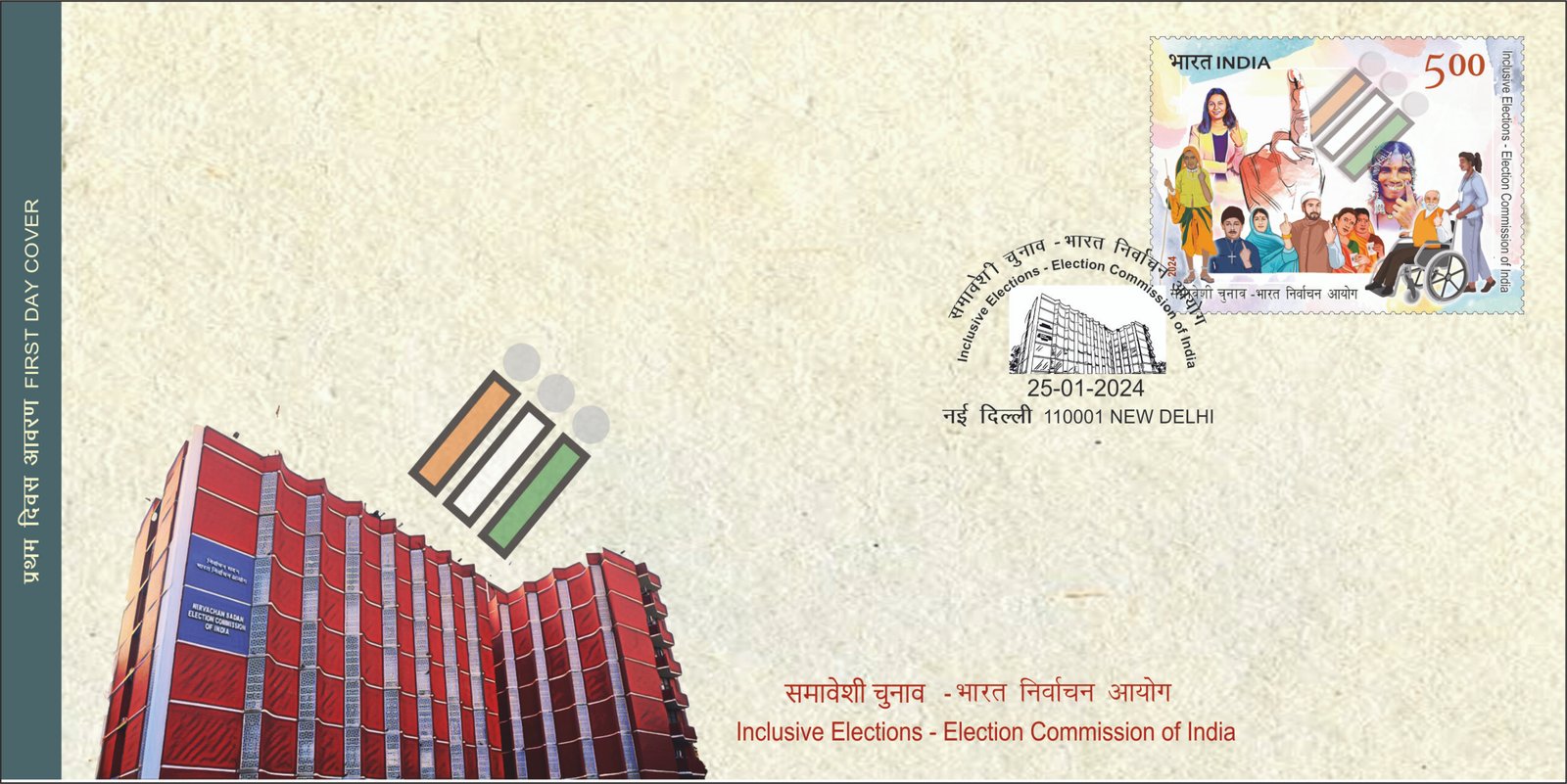Inclusive Elections – Election Commission of India

Technical Data
| Date of Issue | January 25, 2024 |
|---|---|
| Denomination | Rs. 5 |
| Quantity | 301,680 |
| Perforation | 14½ x 14¼ |
| Printer | Security Printing Press, Hyderabad |
| Printing Process | Wet Offset |
| Watermark | No Watermark |
| Colors | Multicolor |
| Credit (Designed By) | Ms. Gulistaan |
| Catalog Codes |
Colnect codes IN 2024.01.25-01 Michel IN 3977 Yvert et Tellier IN 3622 Stanley Gibbons IN 3894 |
| Themes | Elections | Wheelchair Driving |
Guardian of Indian Democracy
The Election Commission of India (ECI) is one of the most respected constitutional bodies in the country, entrusted with safeguarding the integrity of the electoral process in the world’s largest democracy. Established on January 25, 1950, just a day before the Constitution of India came into effect, the Commission was created under Article 324 to ensure free, fair, and impartial elections. Its very foundation reflects the trust placed in the citizens of India to choose their representatives and shape the nation’s destiny.
Democracy and Diversity
India’s democracy is rooted in the principle of universal suffrage, granting every adult citizen the right to vote irrespective of caste, religion, gender, or socio-economic status. This inclusivity seamlessly weaves India’s cultural, linguistic, and geographical diversity into a united political fabric, strengthening the idea of unity in diversity.
ECI’s Role in Free and Fair Elections
Over the decades, the Election Commission of India has conducted 17 General Elections and more than 400 State Assembly elections, currently serving an electorate of over 96 crore voters. This vast voter base includes nearly equal participation from men and women, along with recognition of about 48,000 third-gender voters and 81.22 lakh Persons with Disabilities (PwDs). Remarkably, the voter list also includes 1.84 crore senior citizens aged 80+ and over 2.55 lakh centenarians, while 1.85 crore new voters aged 18–19 continue to enrich India’s democratic spirit.
Towards Inclusive Elections
The Commission works tirelessly to ensure elections are inclusive, accessible, and participative. Initiatives such as National Voters’ Day (NVD), the ‘Desh ka Form’ campaign, Democracy Rooms for first-time voters, and awareness drives like the Matdata Junction radio program encourage greater voter participation. Special measures—such as home voting for senior citizens and persons with disabilities, and permanent Assured Minimum Facilities (AMF) at polling stations—underscore the ECI’s commitment to inclusivity.
Embracing Technology for Transparency
To enhance credibility and efficiency, the ECI has pioneered innovations like Electronic Voting Machines (EVMs), Voter Verifiable Paper Audit Trail (VVPAT), fact-checking tools, and voter engagement apps such as c-Vigil, Voter Helpline App, Know Your Candidate App, and Suvidha App. These digital advancements empower voters, increase transparency, and combat misinformation in elections.
A Global Example in Election Management
The establishment of the India International Institute of Democracy and Election Management (IIIDEM) highlights ECI’s role as a global leader in sharing electoral expertise. Through collaborations with over 140 nations, the Commission provides training, assistance, and knowledge-sharing, reinforcing India’s standing as a beacon of democracy worldwide.
The Commemorative Stamp
In recognition of its unwavering service, the Department of Posts proudly issues a commemorative postage stamp on ‘Inclusive Elections in India’. This special stamp honors the Election Commission of India’s remarkable contributions in safeguarding free and fair elections, encouraging voter participation, and ensuring that the democratic system remains robust, inclusive, and transparent. For philatelists, this stamp is a tribute to India’s enduring democratic journey and the vital role of the ECI in shaping it.
First Day Cover

